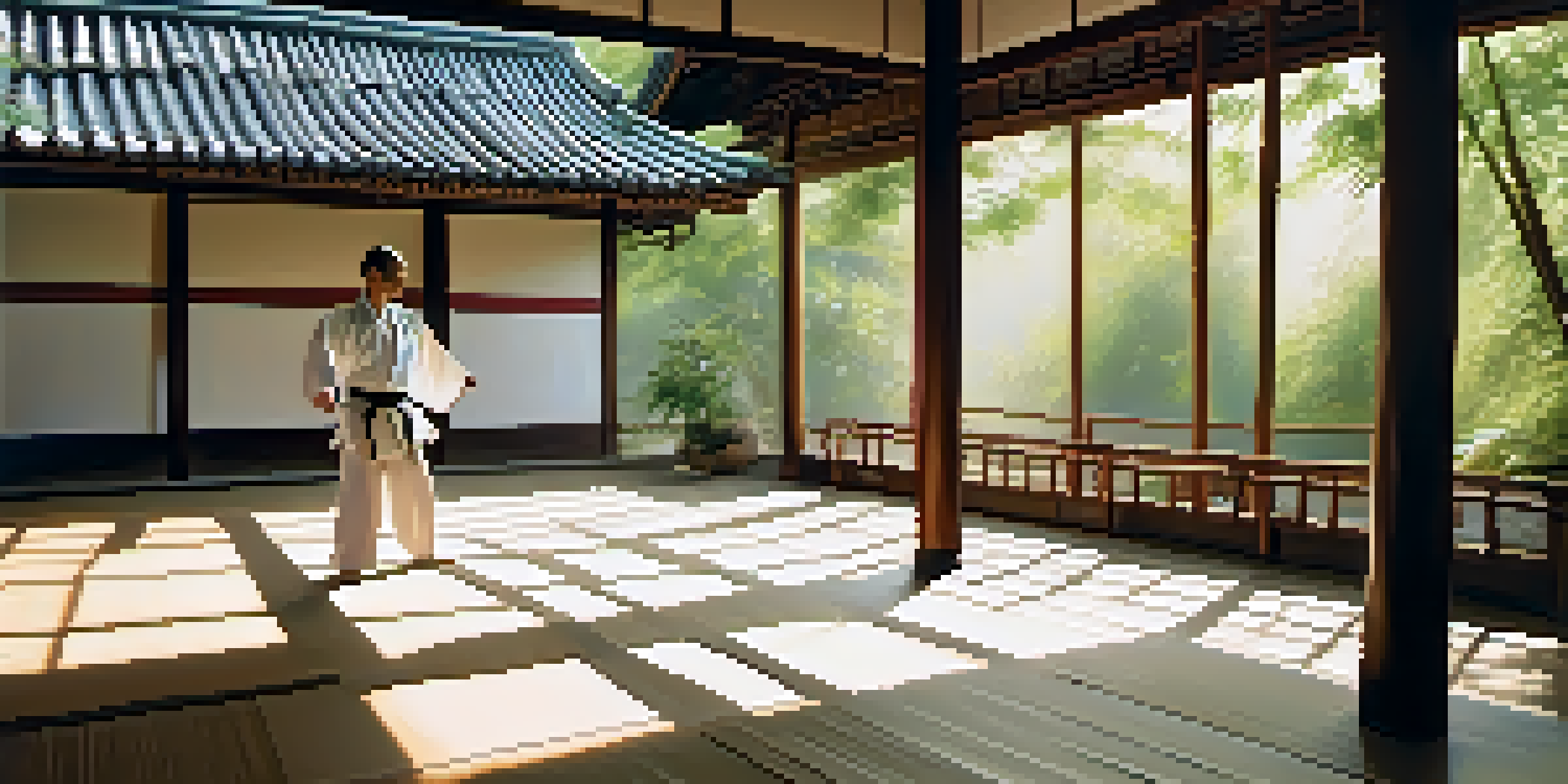The Role of Breathing in Martial Arts for Stress Relief

Understanding the Connection Between Breathing and Stress
Breathing is not just a physiological process; it plays a vital role in our emotional well-being. When we experience stress, our breathing often becomes shallow and rapid, which can exacerbate feelings of anxiety. Conversely, controlled breathing can activate the body's relaxation response, helping to mitigate stress levels.
Breath is the bridge which connects life to consciousness, which unites your body to your thoughts.
In martial arts, practitioners are taught to harness the power of breath to enhance focus and calm the mind. By understanding how breathing affects our physical and mental states, martial artists can use this knowledge to cultivate a sense of peace even amidst chaos. This connection is foundational for stress management.
Think of breathing as the bridge between the mind and body. Just as a well-tuned instrument produces beautiful music, proper breathing can harmonize our internal systems, promoting resilience against stress. This is why breathing techniques are essential in martial arts practice.
Breathing Techniques Used in Martial Arts
Martial arts encompasses various styles, each with unique breathing techniques that contribute to stress relief. For instance, Tai Chi emphasizes slow, deep breaths that synchronize with movement, helping practitioners stay grounded and centered. Similarly, Karate often incorporates specific breathing patterns during strikes to enhance power and focus.

Another popular technique is diaphragmatic breathing, which involves engaging the diaphragm for deeper inhalations and exhalations. This method not only calms the mind but also increases oxygen flow, which is essential for physical performance. Learning and practicing these techniques can significantly enhance an individual's stress management toolkit.
Breathing Reduces Stress Levels
Controlled breathing activates the relaxation response, helping to lower stress and anxiety.
These techniques serve as a reminder of the mind-body connection, illustrating how a simple act like breathing can lead to profound changes in our emotional state. As martial artists refine their skills, they also cultivate a deeper awareness of their breath, paving the way for greater emotional balance.
The Science Behind Breathing and Stress Relief
Research shows that controlled breathing can significantly reduce levels of the stress hormone cortisol. When we engage in deep, rhythmic breathing, our body activates the parasympathetic nervous system, which counteracts the stress response. This physiological change can lead to feelings of calm and relaxation.
The mind is everything. What you think you become.
Studies have demonstrated that practitioners of martial arts who incorporate breathing techniques report lower levels of anxiety and improved mood. This highlights the importance of integrating these methods into regular practice, as they not only enhance physical performance but also mental well-being.
By understanding the science behind these techniques, martial artists can appreciate their value even more. Just as a well-executed technique can lead to victory in the dojo, effective breathing can be a powerful ally in the battle against stress.
The Role of Mindfulness in Breathing Practices
Mindfulness is about being present in the moment, and when combined with breathing techniques, it can amplify stress relief. In martial arts, this practice encourages individuals to focus solely on their breath, helping to clear the mind of distractions and worries. This focused attention can foster a sense of tranquility and clarity.
When martial artists practice mindfulness alongside their breathing exercises, they develop a deeper awareness of their thoughts and emotions. This can help them recognize stress triggers and respond more effectively. It's like having a mental toolkit that equips them to handle life's challenges with grace.
Mindfulness Enhances Breathing
Combining mindfulness with breathing practices fosters clarity and tranquility, improving emotional awareness.
Incorporating mindfulness into breathing practices creates a powerful synergy that enhances overall well-being. By making breathing a mindful practice, martial artists can cultivate a lasting sense of calm that extends beyond the dojo into everyday life.
Practical Breathing Exercises for Stress Relief
There are several simple breathing exercises that anyone can practice, whether they’re martial artists or not. One effective method is the 4-7-8 technique, where you inhale for four counts, hold for seven, and exhale for eight. This exercise not only calms the mind but also helps to lower heart rate and blood pressure.
Another great exercise is box breathing, which involves inhaling, holding, exhaling, and holding again, each for a count of four. This rhythmic pattern can be particularly grounding during moments of stress, allowing individuals to regain control over their breathing and emotions.
These exercises can be easily integrated into daily routines, providing quick and effective ways to manage stress. By setting aside just a few minutes each day to practice these techniques, individuals can experience profound benefits in their mental health and overall well-being.
Incorporating Breathing Practices into Martial Arts Training
Integrating breathing techniques into martial arts training can enhance both performance and stress relief. Instructors can incorporate focused breathing exercises during warm-ups or cool-downs, encouraging students to tune into their bodies and breath. This can set a positive tone for the entire class.
Additionally, martial artists can practice specific breathing techniques during their drills and sparring sessions. By consciously controlling their breath, they can improve focus and decrease anxiety, leading to better performance under pressure. It's about using breath as a tool for empowerment.
Long-Term Benefits of Breathing
Consistent practice of breathing techniques boosts emotional resilience and overall well-being over time.
Creating a culture around mindful breathing within martial arts communities fosters an environment of support and understanding. As practitioners share their experiences with breathing and stress relief, they can inspire one another to explore these techniques further, enriching their martial arts journey.
The Long-Term Benefits of Breathing Techniques
The benefits of incorporating breathing techniques into martial arts extend far beyond immediate stress relief. Over time, consistent practice can lead to improved emotional resilience, allowing individuals to navigate life's challenges with greater ease. This long-term transformation can enhance overall quality of life.
Moreover, as martial artists become more adept at managing stress through breath, they may notice improvements in other areas such as sleep quality, focus, and physical performance. The ripple effect of these benefits can positively impact both personal and professional aspects of their lives.

Ultimately, the journey of mastering breathing techniques in martial arts is a continuous process. As practitioners evolve, they not only cultivate physical strength but also develop a profound sense of inner peace that serves them well outside the dojo.